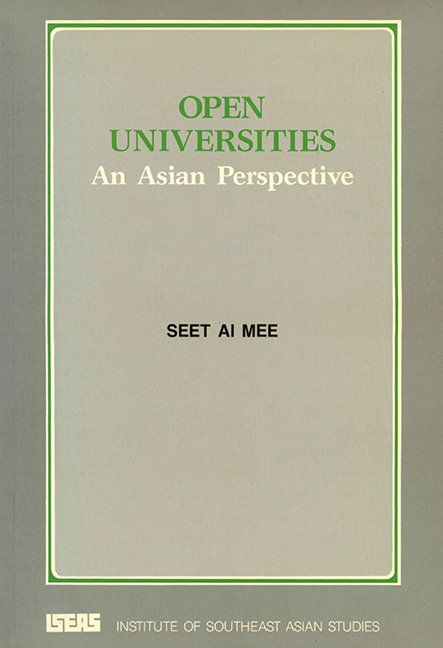Book contents
- Frontmatter
- Contents
- Acknowledgements
- I Introduction
- II Open Universities
- III The Quality of Distance Education
- IV Science and Technology Teaching
- V Continuing Professional Education
- VI Costs of Distance Education
- VII Concluding Remarks
- Notes
- Select Bibliography
- Abbreviations
- Member Institutions of the Association of Asian Open Universities
- THE AUTHOR
- Frontmatter
- Contents
- Acknowledgements
- I Introduction
- II Open Universities
- III The Quality of Distance Education
- IV Science and Technology Teaching
- V Continuing Professional Education
- VI Costs of Distance Education
- VII Concluding Remarks
- Notes
- Select Bibliography
- Abbreviations
- Member Institutions of the Association of Asian Open Universities
- THE AUTHOR
Summary
Conventional universities are expensive institutions to create and maintain, and as the number of younger Asians increases, there is a need to provide alternative routes to higher education. It is at this higher education level that many countries have introduced open universities to provide for those who were unable, for a variety of reasons, to have their opportunity for higher education earlier in life. Open universities, especially in developed countries, have also been found to satisfy the educational needs of disadvantaged people. They are particularly suited for those who find it difficult to leave the home environment, for example, handicapped people; those in prison; and women who work in the home. In many countries, such as in Australia, Canada, and Thailand, where there are interested people living in remote and sparsely populated areas OUs provide the only opportunity for higher education.
While the British Open University has set the pattern for open universities, there are other patterns of open learning establishments which have emerged in the last two decades. The different types can be grouped into the following categories:
(a) “stand alone” universities;
(b) dual mode models;
(c) “stand together” universities;
(d) “parasitic” institutions/agencies.
“Stand Alone” Universities
The British Open University (or UKOU) is the prime example of this category. Since its inception in 1969, this OU has been instrumental, by assistance and example, for the birth of similar “stand alone” open universities in Europe, the Middle East and Asian countries. They are independent academic institutions with formal structures. They establish the curricula, create the courses, provide the materials for students, the support services for student learning, conduct the monitoring and assessments of student performance and award the qualifications. Academic staff teach, develop, and write curricula and have research responsibilities. Non-academic staff administer, provide human support programmes, run assessments and examinations, run publishing services including fully independent printing operations.
- Type
- Chapter
- Information
- Open UniversitiesAn Asian Perspective, pp. 5 - 10Publisher: ISEAS–Yusof Ishak InstitutePrint publication year: 1992



